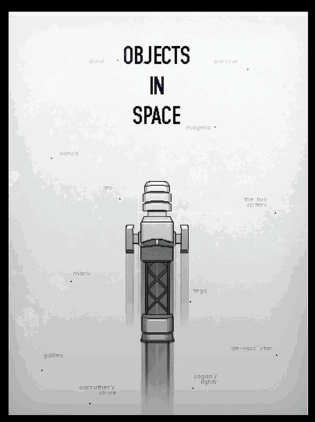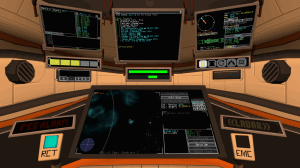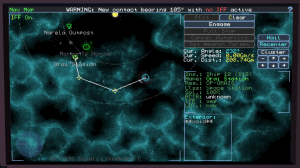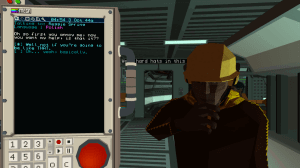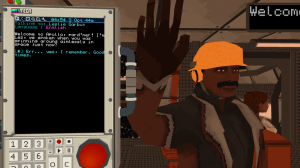Objects in Space is a player- driven sci-fi adventure game, where you take the helm of a spaceship and make your way through the stars, with a special kind of twist. Instead of testing your reaction time and steering skills, Objects asks you to interact with a realistic, futuristic world, populated by characters with their own individual lives and personalities.
Objects’ polygon-3D graphics hearken back to the style of simpler, older games. Text-focused displays allow you to focus on the poignant, hilarious dialogue, carefully written into the script. The people you encounter on your travels will ask difficult things of you, and offer you tempting choices. It’s up to you to decide what kind of pilot you’ll be.
Objects in Space had its early access release in June, after a successful week of early testing. I was able to be part of that first test, and I immediately fell in love with the depth the team put into it. Recently, I was able to get in contact with one of the members of that team, and ask them a few questions.
What name do you go by, and how are you involved in the making of Objects in Space?
Elissa: My name is Elissa Harris, and I’m the programmer and co-designer of Objects in Space. The game was conceived by my brother Leigh and myself, and I spend most of my time coding it, with Leigh having the role of lead designer.
What are your favorite games, and why?
Elissa: Of all time? For entirely different reasons, I’d have to say Ultima VII, Grand Theft Auto V, Silent Hunter III and (for something completely different) Digital: A Love Story.
As for why?
Ultima VII is the first truly open world game I can remember playing, and to this day I feel it remains the gold standard for open-world RPGs. Nothing before or since has, for me, had such a sense of life, authenticity and true ‘open-ness’. It’s a world that to this day feels real to me.
GTA V… well, honestly, because it’s fun, and the most polished open-world game I can think of. It may have its flaws and problematic narrative points, but I can’t think of another game so entirely perfect in its balance and polish.
Silent Hunter III because it did something I’d never really seen before – blend the idea of something enormously ‘realism-based’ (being that it’s a submarine sim) with a sense of existing in that world. You make command decisions between missions, and the fact that you can almost never survive the entire of WW2 gives a sense of just how rare it was for submariners to survive in that war.
And Digital? Because there’s nothing like it. It’s a retro sci-fi in a sense, whose aesthetics took me back to my childhood in a way that no other game has. I’ve re-played it several times, and it remains one of my favourite video game stories. (Digital: A Love Story is, I suppose, technically a ‘visual novel’, but in practice it’s an odd kind of virtual-BBS game and love story)
Were you a fan of the space/sci-fi genre before you started working on Objects in Space?
Elissa: Sort of? I was a huge fan of some of them growing up, but I’m not very good at flight simulators, and so many games I otherwise loved (like Privateer and Frontier: Elite) felt limited to me as I would usually die in a dogfight and always feel like I was just not a skilled enough pilot to truly explore the amazing sci-fi worlds they presented.
But in other media, I was obsessed. I watched every Star Trek episode there was, along with Babylon 5 and even some pretty terrible schlocky sci-fi. I especially loved the aesthetic of ‘70s and ‘80s sci-fi. The worlds they presented always felt so ‘lived in’ and gritty.
What inspired the creation of Objects in Space?
Elissa: Well, actually, more or less what I described above. It’s kinda why we began to conceive of Objects in Space. We wanted to make a game that was both an open-world trading game, but also one where your command decisions and not your ability to pilot a virtual craft and gun down targets was what mattered.
So many sci-fi movies showed space battles as tense moments and command decisions, and yet almost all video games borrowed from the Star Wars playbook of WW2-dogfighting.
Both my brother and I loved exploring big sci-fi worlds, and the idea of keeping a run-down freighter flying for Just One More Cargo Run, but wanted something which made your decisions and strategic choices matter more than your ability to shoot down enemies with pixel-perfect precision.
What’s your favorite part of the development process so far?
Elissa: Honestly? Releasing the game.
Which probably doesn’t sound that weird, but for me, releasing a game is always painful. It means the beginning of the end of the project, and also the stress of going, “Will people like it? Will they get what we were going for?”
Where-as with Objects, to our delight we found a small but vocally excited fanbase almost from day one, and it’s encouraged us to keep going and build it better and better.
It’s one of the few times where reading previews and stories people tell of what happened in their game of Objects in Space just… excited me.
What’s your favorite part of the game?
Elissa: Making mistakes.
It’s a game where failing is almost the most fun. Not major failures – but that moment when you take your eyes off the nav map for a bit too long, or mis-judge a risk or mis-plot a course and suddenly you find an alarm as micro-meteors are slamming into your hull and your ship is taking damage.
That desperate “Uh-oh, I need to get out of here,” moment coupled with the struggle to open up the busted modules and get your ship back in running order, often cannibalising parts from other systems… that appeals to me.
It’s the main thing we wanted from the game, and it’s still my most fun.
A lot of NPCs in the game speak all kinds of languages, ranging from “Panglish” to Finnish, which is specifically noted above their dialogue. Was there a reason for this?
Elissa: Narratively, and in terms of world-building, we wanted a world that felt genuinely diverse. When we walk around the city we live in, we hear tons of languages other than English, and we figured – if there was a perfect translator that worked all the time, like we hear about in Star Trek… surely you’d actually hear more languages?
So if we had everyone speaking English, it should wouldn’t fit our experience. Even in a western country like ours, there are people all around us speaking so many languages. Obviously, our game has text only for interactions, but it was so easy to just put a language for each character and have it vary quite a lot that we really felt it was important.
A small amount of effort for us, and it helped us make a world that felt more real in terms of what life really is like these days living in a big city.
If you want something to feel authentic, a ton of grizzled white men and pretty white women speaking English just doesn’t feel real to us.
What are your hopes for the game moving forward?
Elissa: I suppose, just that we find more like-minded players who get as much out of it as we do.
It’s frustrating sometimes, developing games, but when you add a new feature or tweak something or fix something and see players getting visibly excited on forums, twitter or discord, it makes it worth it.
But more specifically?
There are features we want to flesh out. Things we feel we’ve kinda half-managed, but which could be SO much better.
In fact, it seems like almost every week we come up with new ideas, or hear great “what-if” suggestions from players, and being able to implement all of them may be impossible, but giving it a shot would be great.
Is there anything else you’d like to say?
Elissa: I suppose… Objects in Space is a rather odd game. Or, niche at least. That’s a huge risk, really. But we really wanted to do it. We knew we were highly unlikely to have the next Indie Hit and become rich, but that’s fine. I don’t think that’s a good goal for any indie game developers.
You have to love the game you’re working on, at least enough to enjoy the process of making it.
Objects is a huge passion project for us, and one that was conceived by us years before we got a chance to make it.
But it exists now, and we’ve still got more time in Early Access to keep developing it and making it the best game it can be.
It’s incredibly satisfying to see people playing it, and that alone made it worth the risk.
If you want to try Objects in Space yourself, you can find it on GOG and on Steam. For more information, visit the game’s website, here.


